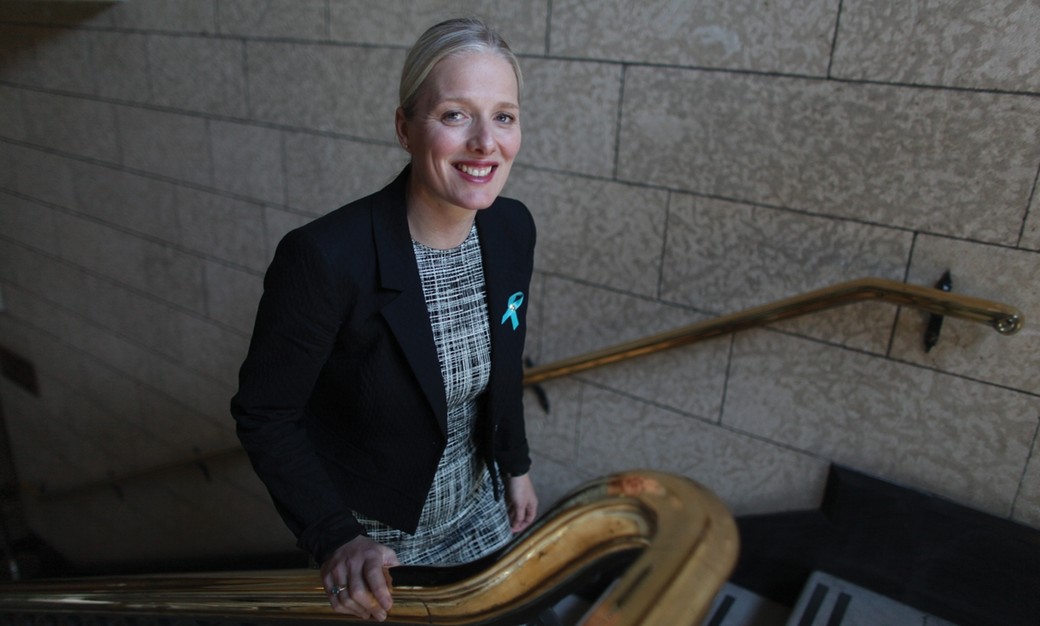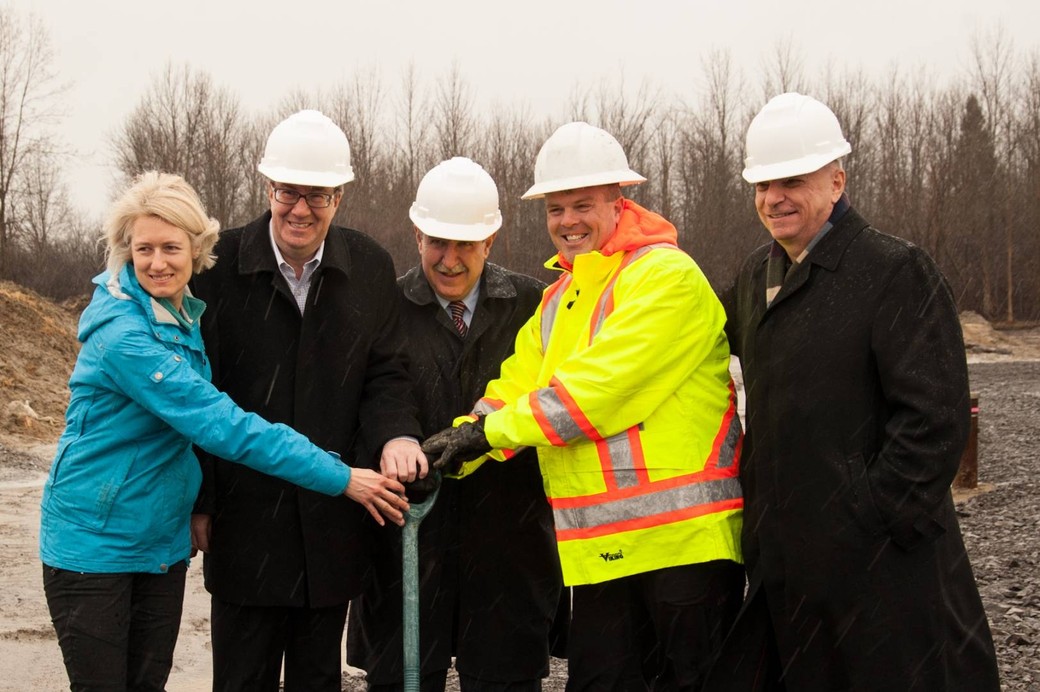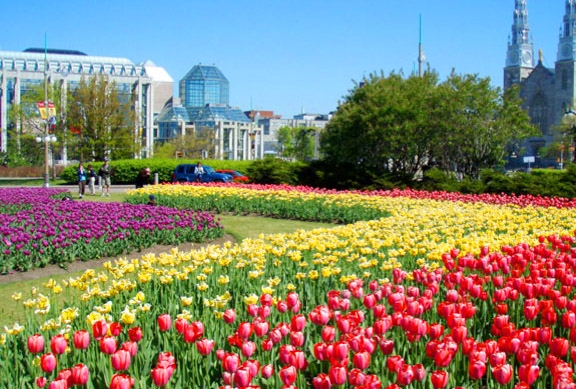
For Catherine McKenna, Green is the Gold
It has been a year since Catherine McKenna walked down the driveway at Rideau Hall and was sworn in as the Minister of Environment and Climate Change. The general public was allowed on the grounds to soak in excitement and the atmosphere was electric.
This was a hard fought battle for McKenna but it was not without its reward. She set records across the board. Ottawa Centre was the riding with the highest voter turnout in the country; McKenna won with the best Liberal result in the riding’s history at 42 per cent; and, McKenna was the first female Member of Parliament to be elected in Ottawa Centre.
Now elected and in Cabinet, she continues to make waves in Ottawa and abroad – all while keeping her family and the city she loves on the top of the priority list.
OTTAWA LIFE: Before politics you had an incredibly successful career and yet you put everything on hold to run for Justin Trudeau in Ottawa Centre – making this commitment even before the NDP started losing its grip and against a strong incumbent, NDP MP Paul Dewar. Yet, you didn’t hold back. Rumour is you knocked on over 100,000 doors. What motivated you to take this risk?
CATHERINE MCKENNA: I decided that there was a need for a change in government and we could be doing more for the issues I really cared about which ranged from Indigenous peoples, to foreign policy, to Canada’s role in the world, to local issues. It wasn’t that I thought Paul Dewar wasn’t a good MP, but I thought we could do more.
So, I decided just to step up and run and I did it very early. It was the early summer of 2013 where I decided there was a real opportunity to get change with Justin Trudeau and I thought he needed a new generation of people who were going to step up and run with him.
I had the support of my family – I asked my kids and my husband had to be supportive. One of my daughters said, ‘will you care about Indigenous youth?’ and that was important to her.
The other one said: ‘We need more women in politics!’ and I think that was important too. I would go to a lot of events where they would talk about the need for more women to run and then women wouldn’t run. Then I had the opportunity.
I felt that I had the experience fundraising, because I started my own charity and you have to put yourself out there and fundraise. I also thought I had good ideas and then there was an opportunity to build a team. I just decided that it was going to be a tough riding, but if I was going to run I was going to have to prove myself to the residents of Ottawa Centre and that it was going to take time to do that.
OTTAWA LIFE: The latest rumour is that Paul Dewar may run for Mayor of Ottawa if Mayor Jim Watson chooses not to run. What are your thoughts on that?
CATHERINE MCKENNA: Obviously that is a big decision for Paul Dewar to make. But what I will say about Paul Dewar is that I have great admiration for him. He was well liked in the riding and he worked very hard for constituents. He clearly care about public service, so I would absolutely encourage him to continue working for the greater public good because I think he has a real role to play – whatever that role is.
OTTAWA LIFE: Prime Minister Trudeau, made history by inviting the general public to attend the swearing in at Rideau Hall. What was the experience of being sworn in as Minister of Environment and Climate Change and just going through that crowd and feeling that energy?
CATHERINE MCKENNA: I was still a little bit overwhelmed by winning and by the fact that so many people I recognized and who had worked on my campaign were actually out there and so excited. It was a beautiful day, which made it kind of funny; you know ‘sunny ways’ and a sunny day.
It was also the honour of being asked to be in the Cabinet in a role that I thought was so critical, that it really is important for Canada but also for the world. It was really exciting. Also looking around, we had a very diverse team it was amazing. Obviously the first gender balanced cabinet and a lot of awesome men and women, it was really just amazing.
OTTAWA LIFE: Environment and Climate Change is not traditionally an easy portfolio by any stretch and on top of that the Prime Minister has given you quite the to-do list in your Mandate Letter – from climate change, to National Parks to water security and migratory birds. That being said, you are already ticking items off at a steady pace. What has been the greatest challenge in managing these priorities?
CATHERINE MCKENNA: That is a really good question. Clearly the climate file is a file that is really important right now. We said that we would have a plan, a plan with the provinces and territories, so that was a clear priority. I came into office and once I was in Cabinet I was on a plane a couple days later to Paris for climate negotiations.
But I think one of the challenges is balancing the work that needs to be done on climate change, that it requires a lot of effort and thought and time, and working with not just the provinces and territories but with Indigenous peoples, business and environmentalists.
There is that piece, but course there are all the other areas that we are working on, from dealing with species at risk, the dumping of sewage in Montreal and to environmental assessment that are also part of my portfolio. Not only looking at immediate environmental assessments and finding the right balance between mitigating the impacts of projects and making sure that they can go ahead in a way that is sustainable and the economic piece to them, but also doing a full review of our environmental assessment process, which only happens every few decades.
So there are just a lot of pieces going on and I think [the key] is being disciplined about how you prioritize things and at the same time making sure that you’re paying attention to all the portfolio.
[For example] Parks 2017 is really exciting because it is going to be free access to our parks, national historic sights, and marine conservation areas. It is very important to me that we promote that and get new Canadians out there as well as families that may not have the financial means together.
[In this role] you have a lot of different files and it is making sure that you have priorities and you are actually advancing all of those files, because my mandate letter is a significant one.
One of the things that I don’t get enough time to talk about is Rouge National Urban Park. Early on in my mandate it became apparent that there was an opportunity to expand Rouge, which was our first national urban park. It is within an hour of 7 million people and it is accessible by public transit. It is about that idea of being able to do what the previous government was not able to do, come to an agreement with the province, [work with stakeholders], bring everyone together and creating this huge space which is absolutely gorgeous and a part of Toronto that many people don’t even know about. You can get new Canadians, you can get all sorts of people, people who have never camped before experiencing the wilderness, that was pretty special too.
OTTAWA LIFE: No matter how hard you work or how much you consult, there will always be someone who is disappointed. How do you handle that?
CATHERINE MCKENNA: I recognized pretty early on that it is hard to keep everyone absolutely onboard. In my portfolio I work extremely hard to meet with everyone from Indigenous peoples to business to environmentalists to young people to labour to provinces to municipalities and the list goes on. It is so hard to keep everyone happy all the time. There are going to be decisions I make that some people won’t like. I just hope that people can see that I make them in a way that is based on science, evidence, in traditional knowledge and that I’ve taken seriously the concerns that have been expressed. That I made a decision, that while you may not agree with, it was a decision that there was basis to do that.
I feel I will be comfortable as long as most people think that I am right most of the time. It is something that Jean Chrétien said to me: ‘Canadians are reasonable people, that if you work hard, if you listen, you’re ambitious and you do your best, people will respect you.’ So that’s my goal. This is a tough job, I signed up for it and it is really the big picture that you have to be concerned with, and making sure that I bring as many people on board and at a certain point you have to make decisions. I’ve had to make decisions that not everyone liked, but hopefully people see I’m working very hard and I have taken into consideration the diversity of perspectives.
OTTAWA LIFE: You recently announced that you were moving forward with a plan for pricing carbon – something that the Liberal Party has been supporting since 2006. What do you think will be the greatest challenge in putting the system in place?
CATHERINE MCKENNA: So, as I like to say, it is pricing pollution. It is pricing what we don’t want. Right now we are not making companies pay the full cost for polluting and we are just passing it onto the next generation.
The biggest challenge is a communications challenge. It is easy to be negative and say ‘don’t do that, we don’t want that.’ It is harder to explain in a sound bite why it makes sense to do this. I think that is the most important message I am trying to get across – that we want to price what we don’t want, pollution, and we want to get innovation.
Companies will figure out how to find clean solutions. Those are the solutions that we will not only be able to use here but we will be able to export to places like China where there is a $3 Trillion opportunity and they need cleaner solutions. Not only does it position ourselves for the economy for the next few years, for the next decade, for the next fifty years. But it also doing our part to tackle climate change and reduce emissions.
Of course, I also have three kids so it’s building a more sustainable future for them. But you need to be able to tell stories, so I am working really hard to make it not something really technical. I don’t think most people necessarily understand when you talk about cap-and-trade or direct price on carbon, but will understand instead when you talk about putting a price on pollution – what you don’t want. [This policy] is also in place so we can innovate ourselves into a better position, to create good jobs for the future, grow our economy and export opportunities. It is also about our kids, what legacy we are leaving for them – I find that resonates. There are only so many opportunities that I get to say that, so I am trying to bring as many people on board.
I have been very fortunate because everyone from labour to the provinces, in which 80 per cent of Canadians live in a province where there is a price on pollution already, to business, have signed onto a Carbon Pricing Leadership Coalition. They are saying ‘put a price on pollution, we will innovate, we will create good jobs and position ourselves for the future.’
Bringing everyone onboard is really important and so I think that is why overall, as public opinion research shows, that Canadians are generally supportive of pricing pollution. We still have a ways to go to explain it and explain how that fits into our broader climate plan, including energy efficiency and creating incentives for Canadians can save money on their homes – they are all other pieces to it.
I think a lot of it is how you talk to people in a real way that is tangible and makes sense. I am originally from the Hammer and you know, I always go back to that. If I were trying to explain this to someone on the street in Hamilton, how would I explain why it is important to take action on climate change now and how putting a price on pollution fits into that? That is a challenge but also an opportunity.
OTTAWA LIFE: Another priority outlined in your Mandate Letter was to develop an ambitious North American clean energy and environment agreement with the US and Mexico – which resulted in the announced North American Climate, Clean Energy, and Environment Partnership during the American Leaders Summit back in June. How do you see that taking shape going forward?
CATHERINE MCKENNA: Well it is already taking shape. We work extraordinarily closely with the Americans and Mexicans. I was just in Mexico where I had a Summit with my Mexican and American counterpart. There are a lot of ways we are moving forward.
One of goals was 50 per cent clean power across North America and the good news is that Canada is 80 per cent clean power, so there is a huge export opportunity. I am certainly going to be making the case that this is a real opportunity for Canada and as a solution for the US, because pollution knows no borders.
We also work very closely on promoting on the international front. Beyond an ambitious Paris agreement and now the implementation piece – I am going to be in COP 22 where I will be seeing my American and Mexican counterpart – we just got a really great agreement to phase out hydrofluorocarbons, which are in refrigerants and air conditioners. We worked extremely closely with the US and Mexico on that.
We are reducing methane emissions from oil and gas by 40 – 45 per cent, which is like taking all the cars in Ontario and Quebec off the road. We are aligning our emissions standards for vehicles. All of these things are very practical things we could be doing with US and Mexico and we are just going to continue to do that.
It was great that I was able to meet my mandate commitment by working really hard with them to get a great agreement. Regardless of who is elected we will continue working together.
OTTAWA LIFE: I’d like to switch to issues in the National Capital region (Ottawa) for a moment. A group called the Moose Consortium Inc is working on creating a privately run commuter train that would the connect the National Capital on both sides of the river using existing rail infrastructure, including the unused Prince of Wales Bridge. One part of their mission is to cut down on local traffic, and therefore, carbon emissions, so this seems like a natural fit for your involvement. So first, have you heard of this before?
CATHERINE MCKENNA: So I have heard of this initiative, it sounds interesting. I always support people coming together to come up with innovative ideas. My hashtag for Ottawa is #OwnYourOttawa. I’m really about being ambitious for Ottawa and broadly as the National Capital Region.
Anything of this nature you have to bring the municipalities onside, that is really key. That is the approach we have taken as a government when it comes to investing in public transit, for example, we work with the municipality and the province, and obviously stakeholders. So interesting initiative and I think the key is getting the municipalities on board as part of their broader transportation plan.
OTTAWA LIFE: Do you see an opportunity for you to help guide this process?
CATHERINE MCKENNA: I am not entirely sure what role they would be looking for me to play, but I am always happy to bring different people together. I think that initiative is still in the early stages and I think they need to work with the cities, on both sides, regarding what is the broader transit strategy. I think it is important that we figure out how we get people who either live in Gatineau or live in Ottawa, but work on the other side, or businesses relying on people going back and forth. I think we need to figure that piece out but I think it has to be thought of in the broader context.
OTTAWA LIFE: There is a lot of buzz in Ottawa about a new two-way bike lane on O’Connor which is a one way street. I know you are an avid cyclist, among other things, so what are your thoughts on the bike lane? Have you tried it out?
CATHERINE MCKENNA: I used it right before it was going to open. It seems pretty amazing. I am absolutely supportive of cycling infrastructure and I think we need to make sure it is safe. People are still getting used to the fact that it is two ways.
I am someone who really believes in the importance of safety because I think that is the only way you are going to get people out there. It should be a really safe way to get around and I think there is still some work to do in that regard.
But I think it is great. It is part of one of my priorities as Minister of the Environment and Climate Change that aligns well with my local priority of getting people out of their cars, using public transit or cycling. I am also one of the few MPs that can cycle to the Hill – which I have done many times.
OTTAWA LIFE: Earlier this year you said that you turn off your phone for two hours every evening to spend time with your family. With a full year as an MP and Minister under your belt, how are you finding the balance?
CATHERINE MCKENNA: I don’t actually believe you can get a balance. I think it is really making sure you are able to do what is priority. Priorities for me are first my family. I have three young children so making sure they have the time they need. I get home, I focus on the kids, either help them with their homework or do fun things, make sure they actually get washed – that’s a good thing. I also have a lot of work to do, so making sure I also am able to do that at times when they are either sleeping or by getting up really early. It’s hard. It can be very very challenging, so I just try to do my best.
OTTAWA LIFE: Finally, what is the number one activity for someone to do in Ottawa this winter?
CATHERINE MCKENNA: Well, of course, skate on the canal! Use the canal anytime. I was able to get new access points to the canal in the summer so people could put in their canoe or kayak, so that was really exciting. The idea that you can use the canal all year round, is really awesome and part of my vision of an Ottawa that is built around its natural beauty.













